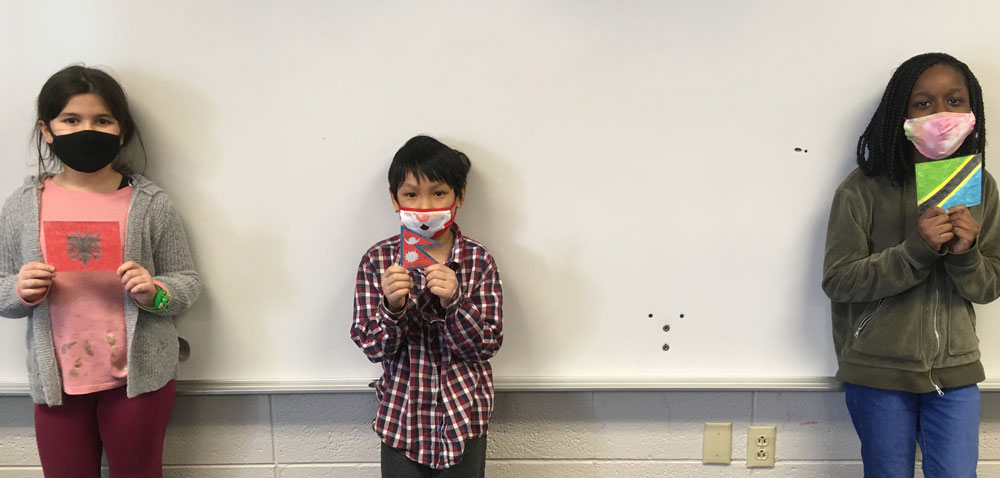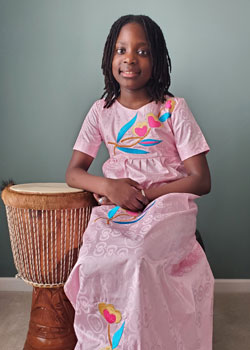Kentwood — A few things fourth-grader Maya Seck appreciates about the West African countries Senegal and Mali: spicy food, traditional clothes and her cousins.
“Sometimes on special days my mom likes to prepare those foods and me and my dad like to dress up and take pictures and we like to pray,” said Maya, who visited Senegal when she was 6. “It was my first time ever being there and I was really excited to see my cousins and my other family members.”
Maya recently shared facts about Senegal and Mali with other students at Explorer Elementary School through the research project Exploring Our World, for which students are studying the countries they are from, creating recordings and slideshows, and sharing them with all classes in the kindergarten- to fifth-grade school.
“I chose those countries because my dad was born in Senegal and my mom was born in Mali,” said Maya, who was born in Washington, D.C. Her parents met in Paris, and Maya speaks English, French and a little bit of Senegal’s national language, Wolof.
In sharing the story of where she is from, Maya’s peers learned about her, while she is learning about them through their stories. Explorer students come from Vietnam, Nepal, India, Tanzania, Rwanda, Congo, Myanmar, Malaysia, Mexico and other countries and are researching their countries as well.

A Celebration of Countries, Cultures
The ongoing project is a way for the school’s 137 ELL students to learn more about where they are from and share it with others, said English language-learner teacher Jessica Hulst. “Each week, we have two or three countries that students have researched about and recorded themselves sharing facts and stories about.”
Many students are newcomers to the U.S. or first-generation Americans who identify with multiple countries and languages. Their projects include details about geography, weather, government, landmarks, important people, music, art and history.
“We are always looking for ways to support children learning about each other’s cultures because we have such a diverse population and children from all over the world,” said Principal Carrie Tellerico. “How can we really help children to understand, ‘Oh, this is where I am from in the world’?”

Some classrooms have mini passport books to stamp after learning about the country of the week.
To do their research, students explore various sources at school and home. They record on Flipgrid or Hulst records them. Many also interview their parents.
“I’ve learned a lot of personal stories because when the kids start researching things, even that they aren’t aware of, a lot of personal stories come up… I learn about who’s in their family, how much English they are or aren’t speaking at home, how many other languages they might be speaking,” Hulst said.
“This is another opportunity for me and other teachers to learn about their backgrounds.”
She added, “A lot of them are really having fun explaining a word that they know. Favorite foods is another (topic) they are really into. Some of them know things about clothing. For the countries (that) have had unrest, they will know a little bit about that from their parents.”
“I like people learning about where I am from.”
— Explorer Elementary fifth-grader Anna Muzinga
Tellerico said it’s also been a way to connect students who are learning in cohorts due to the pandemic: “I feel like it has sparked conversations,” she said.
Fifth-grader Anna Muzinga studied Tanzania, where she moved from with her parents and two siblings when she was a year old. She speaks Swahili along with English.
Explained Anna: “I learned about the traditional dances. I knew about the animals and languages they speak. I got to learn about the flag.”
She said she was “kind of nervous and happy” to share her projects and enjoyed learning about their countries. “They are learning about my country. I like people learning about where I am from.”
Fourth-grader Anduena Feka researched Albania, where her parents are from. “I learned that there were different traditions I learned about. There’s a special food we eat every Friday. It’s like a type of porridge… Now everybody else knows about the country (I’m from) and traditions.”












